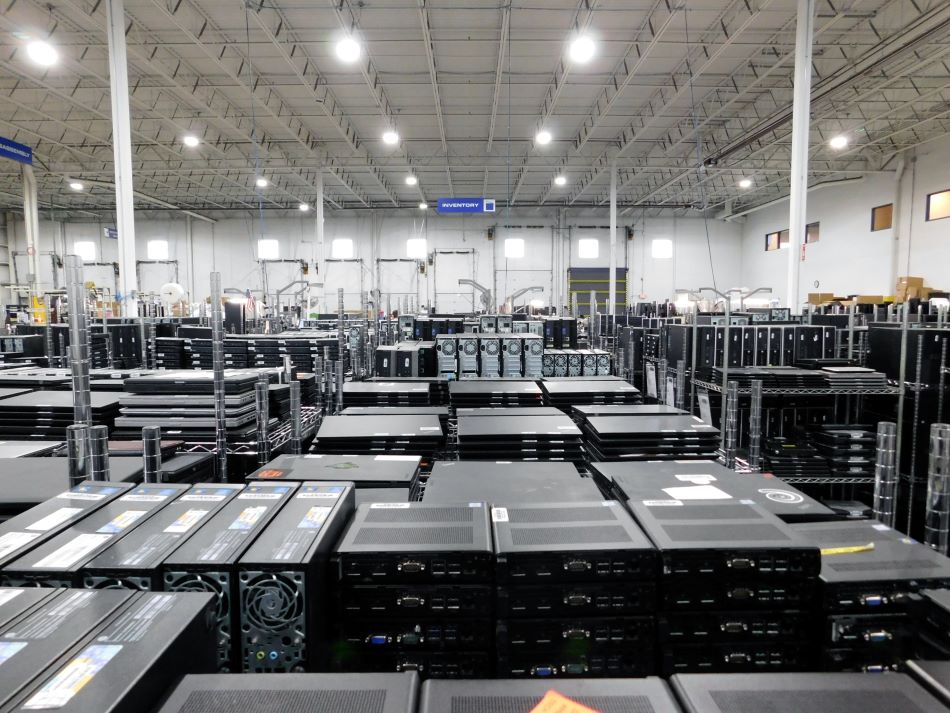
Cascade Asset Management stores assets in a warehouse. It released a survey of customers that found a persistent gap in mobile asset tracking and continuing lack of awareness about certifications. | Courtesy of Cascade Asset Management
Expectations for higher IT spending, a persistent gap in mobile asset tracking and continuing lack of awareness about certifications were among the surprising takeaways in Cascade Asset Management’s latest survey of customers.
The Madison, Wis.-headquartered ITAD firm recently released its ninth benchmarking report, which covered survey results from 54 of Cascade’s organizational and enterprise clients.
The report, which also includes Cascade’s insights on used electronics markets, reflected a downturn in secondary market pricing in 2022, a trend that has been seen across the industry.
But Neil Peters-Michaud, CEO and co-founder of Cascade Asset Management, told E-Scrap News the decline is a return to a more normal market in the wake of high post-pandemic prices.
“It seems like the sky is falling but it’s just kind of more normal, so we have to be ready to work back in that space,” Peters-Michaud said. “If you look at it, we’re really pretty much back to pre-pandemic levels in 2019.”
The following were some other takeaways from the report.
Upward forecast for IT spending
When asked about their expectations for IT equipment investments in 2023 compared with last year, 36% of respondents said they expected to spend more, 34% said they expected spending to remain steady, 13% said they would spend less and the remaining 17% said they were unsure. The percentage saying they planned to spend more was the highest Cascade has ever recorded, according to the report.
“That was the biggest surprise,” said Peters-Michaud, who noted other forecasts are pointing to decreased IT spending.
His company followed up with some clients who indicated they want to remain on a three-year device-replacement cycle, which means they’re expecting this year to replace electronics purchased immediately after COVID-19 emerged, he said. He also said economic impacts are uneven among Cascade’s customers. One large tech company is doing layoffs, resulting in a temporary bump in electronics needing disposition, but Cascade’s insurance, finance, healthcare and government clients are, by and large, expecting to increase sending.
Companies from a dozen different sectors responded to Cascade’s latest survey.
Gaps in asset tracking, despite data security concerns
As was the case in past years, survey respondents indicated that managing data security and privacy risks was of prime importance when it comes to asset disposition criteria. They also emphasized the importance of ITAD provider customer service, with a greater percentage of respondents indicating customer service is important than in the prior year.
Despite the continuing concern about data privacy, clients still aren’t tracking some types of electronics through their final disposition.
For laptops, servers and desktops, the tracking is robust. In fact, 83% of respondents say they track all of their laptops through to disposition, 70% said they track all servers and 68% said they track on desktops. But only 28% of respondents said they track their company-owned cell phones through to disposition, and only 21% track tablets.
Peters-Michaud noted that those numbers haven’t changed much over the years, but they still surprise him.
“You don’t know what you lose if you don’t have it tracked in the first place, and there’s still a lot of room for improvement that we see,” he said, “and it’s something our industry can help with to provide that reporting.”
Pricing came down, especially for desktops
Cascade’s own sales data for 2022 showed a decline in prices for used electronics. Over the course of 2022, the average prices for laptops and desktops were cut in half or more, the report showed.
On average throughout 2022, desktops sold for $53.67, servers for $199.17, laptops for $93.96 and mobile devices for $22.18.
Combined, the 2022 average prices for refurbished desktops, laptops, servers and mobile devices were down 19% from the prior year.
The average desktop price in 2022 was down nearly 26%, compared with a drop of 15% for laptops. Laptops, in particular, skyrocketed during the pandemic, with Cascade reporting they reached an average price peak of $126 during the first quarter of 2021.
Peters-Michaud pointed to softening demand for desktops as companies work to shift to a mobile workforce.
He also noted that, for markets overall, Cascade has seen a bit of a pricing bump in late December and in January.
Cascade shares its refurbished device sales revenue with clients who supply the material. But because customers aren’t overly concerned about their revenue they receive from the sales, the revenue decline hasn’t translated into any lost customers, he said.
Still, Cascade, which now has locations in Wisconsin, Indiana and Florida, noted the economic squeeze processors are facing these days, both from lower revenues from device and commodity sales and higher costs.
“Cascade and other ITAD vendors are experiencing increased labor and asset processing costs alongside decreased revenue from used equipment sales and scrap metal,” a company press release states.
Lack of certification knowledge
Peters-Michaud said that despite all the marketing of certifications such as e-Stewards, R2 and NAID done by his company and other ITAD and recycling companies, there remains a knowledge gap among customers. Relatively few respondents said those certifications are critically important or very important. But a greater percentage responded with the answer “I don’t know what that certification is!”
“Despite everyone’s efforts, the amount of understanding that our customers have about certifications remains very low,” Peters-Michaud noted.


